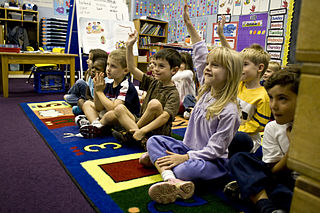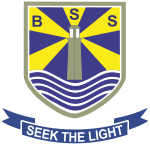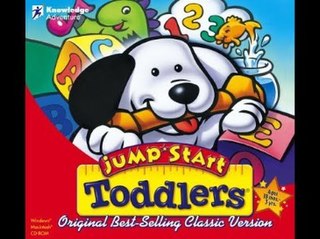
Kindergarten is a preschool educational approach based on playing, singing, practical activities such as drawing, and social interaction as part of the transition from home to school. Such institutions were originally made in the late 18th century in Germany, Bavaria and Alsace to serve children whose parents both worked outside home. The term was coined by German pedagogue Friedrich Fröbel, whose approach globally influenced early-years education. Today, the term is used in many countries to describe a variety of educational institutions and learning spaces for children ranging from two to six years of age, based on a variety of teaching methods.

Childcare, otherwise known as day care, is the care and supervision of a child or multiple children at a time, whose ages range from two weeks of age to 18 years. Although most parents spend a significant amount of time caring for their child(ren), childcare typically refers to the care provided by caregivers that are not the child's parents. Childcare is a broad topic that covers a wide spectrum of professionals, institutions, contexts, activities, and social and cultural conventions. Early childcare is an important and often overlooked component of child development.

A preschool, also known as nursery school, pre-primary school, play school or creche, is an educational establishment or learning space offering early childhood education to children before they begin compulsory education at primary school. It may be publicly or privately operated, and may be subsidized from public funds.
Pre-school Education in Denmark is voluntary and takes place in different types of schools or day care centres covering the time before children enter compulsory education. Today, preschool is where most children enter the Danish education system.
The following outline is provided as an overview of and topical guide to childhood:
A language delay is a language disorder in which a child fails to develop language abilities at the usual age-appropriate period in their developmental timetable. It is most commonly seen in children ages two to seven years-old and can continue into adulthood. The reported prevalence of language delay ranges from 2.3 to 19 percent.
Penelope Jane Leach is a British psychologist who researches and writes extensively on parenting issues from a child development perspective.
In Christianity, ministry is an activity carried out by Christians to express or spread their faith, the prototype being the Great Commission. The Encyclopedia of Christianity defines it as "carrying forth Christ's mission in the world", indicating that it is "conferred on each Christian in baptism." It is performed by most Christians. This is distinguished from the "office of minister", to which specific individuals who feel a certain vocation. It can signify this activity as a whole, or specific activities, or organizations within a church dedicated to specific activities. Some ministries are identified formally as such, and some are not; some ministry is directed towards members of the church, and some towards non-members. See also Apostolates.
Baby videos are educational tool which can be used for teaching babies as young as six months by introducing the alphabet, different sights, shapes and colors, numbers and counting. Baby videos can be used for helping babies learn important educational skills, comprehension, introduction to the environment, as well as music. Some parents use baby videos to help develop their children's motor skills and open their young minds to the world. Certain preschools, educators and caregivers find baby videos to be a useful tool, but medical professionals have yet to determine whether or not baby videos are beneficial to children or not.
The Autism Diagnostic Observation Schedule (ADOS) is a standardized diagnostic test for assessing autism spectrum disorder. The protocol consists of a series of structured and semi-structured tasks that involve social interaction between the examiner and the person under assessment. The examiner observes and identifies aspects of the subject's behavior, assigns these to predetermined categories, and combines these categorized observations to produce quantitative scores for analysis. Research-determined cut-offs identify the potential diagnosis of autism spectrum disorder, allowing a standardized assessment of autistic symptoms.
Early childhood intervention (ECI) is a support and educational system for very young children who have been victims of, or who are at high risk for child abuse and/or neglect as well as children who have developmental delays or disabilities. Some states and regions have chosen to focus these services on children with developmental disabilities or delays, but Early Childhood Intervention is not limited to children with these disabilities.

Music education for young children is an educational program introducing children in a playful manner to singing, speech, music, motion and organology. It is a subarea of music education.
The floortime or Developmental, Individual-differences, Relationship-based (DIR) model is a developmental model for assessing and understanding any child's strengths and weaknesses. This model was developed by Stanley Greenspan and first outlined in 1979 in his book Intelligence and Adaptation.

The Beaconhouse School System (BSS), established in 1978, is a private preparatory school system in Pakistan. Today, Beaconhouse has over 146 campuses in major cities across Pakistan. BSS also operates independent divisions in Belgium, Malaysia, Oman, the Philippines, Thailand, the UAE and the United Kingdom. Its activities extend beyond education in some countries.
Emergent literacy is a term that is used to explain a child's knowledge of reading and writing skills before they learn how to read and write words. It signals a belief that, in literate society, young children—even one- and two-year-olds—are in the process of becoming literate. Through the support of parents, caregivers, and educators, a child can successfully progress from emergent to conventional reading.
In the framework of the Cultural-Historical Activity Theory (CHAT) the leading activity is the activity, or cooperative human action, which plays the most essential role in child development during a given developmental period. Although many activities may play a role in a child's development at any given time, the leading activity is theorized to be the type of social interaction that is most beneficial in terms of producing major developmental accomplishments, and preparing the child for the next period of development. Through engaging in leading activities, a child develops a wide range of capabilities, including emotional connection with others, motivation to engage in more complex social activities, the creation of new cognitive abilities, and the restructuring of old ones.

Early childhood development is the period of rapid physical, psychological and social growth and change that begins before birth and extends into early childhood. While early childhood is not well defined, one source asserts that the early years begin in utero and last until 3 years of age.
Social emotional development represents a specific domain of child development. It is a gradual, integrative process through which children acquire the capacity to understand, experience, express, and manage emotions and to develop meaningful relationships with others. As such, social emotional development encompasses a large range of skills and constructs, including, but not limited to: self-awareness, joint attention, play, theory of mind, self-esteem, emotion regulation, friendships, and identity development.
A preschool, also known as a kindergarten or child care centre in Singapore, is an educational establishment or learning space offering early childhood education to children before they begin compulsory education at primary school. All Singapore citizens born after 1 January 1996 and living in Singapore must attend a national primary school unless an exemption is granted.

JumpStart Toddlers is a 1996 educational video game, the fourth within the JumpStart franchise. An enhanced version was released in 2000.





